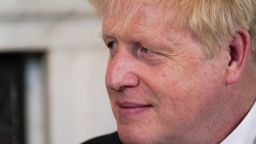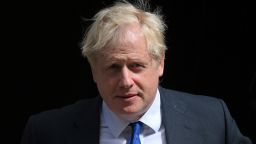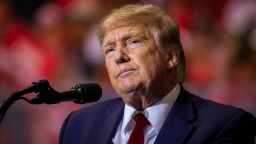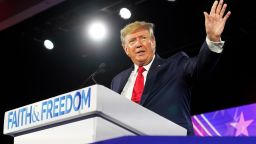Britain’s Conservatives just did what America’s Republicans never dared to do.
They toppled a wrecking ball right-wing populist leader who reeled from one self-created scandal to another and who was accused of flagrantly breaking the law, abusing power and building his political career on an edifice of lies.
After weeks of clinging desperately to office, Boris Johnson finally resigned as the ruling Conservative Party’s leader Thursday after a rebellion by his own lawmakers. The party will elect a new leader, who, according to the customs of Britain’s parliamentary system, will become prime minister.
America’s Republican Party, however, never turned on Donald Trump in the same way – despite his far more ruinous offenses against democracy than Johnson’s. It’s not that Republicans didn’t have the chance. The ex-President was impeached twice, but most GOP senators chose not to vote to convict him of high crimes and misdemeanors last year – a step that could have barred him from future federal office.
The contrasting fates of Johnson and Trump come down to personal factors, electoral politics and the idiosyncrasies in the political systems of two nations.
Johnson was long seen as a vote-winning machine. He was the talismanic figure who won a referendum in 2016 that led to Britain’s exit from the European Union. Then, in a general election in late 2019, he delivered an extraordinary victory for the Conservatives – capturing post-industrial working-class heartlands in England and Wales that had long been the left-wing Labour Party’s power base.
But Johnson was the author of his own demise. His appeal ruptured over revelations that he had attended parties in 10 Downing Street after ordering his country into Covid-19 lockdowns.
That’s why the Conservatives – who have a long record of mutinying against leaders seen as an electoral liability – finally pounced. A similar fate befell the party’s most successful modern leader, Margaret Thatcher, in 1990 and her successor, John Major, went on to win a general election.
Government by chaos
Johnson’s orchestration of the Brexit shocker – after a campaign lambasting the European establishment and inciting a working-class revolt – was in retrospect seen as an early warning sign of Trump’s even more stunning victory, when he won the presidency on a similar tide of populism a few months later.
Trump and Johnson have long been seen as two peas in a pod – and not just because of their strong sense of victimhood and refusal to take responsibility for their transgressions on the way out of office.
Both have turbulent romantic histories, both rose to power on the force of untamed personalities and have distant acquaintances with the truth. Both often appeared to prioritize their own goals and craving to satisfy massive political egos over the national interest. And both tried to cling to office – Trump after losing an election and Johnson as his party deserted him – long after it was obvious they were on the way out.
Still, personal comparisons between Johnson and the other golden-haired rule breaker on this side of the Atlantic have generally been overblown, even if both weaponized resentment against elites to win power.
Despite his extraordinary success in winning over blue-collar voters, much as Trump did with rust-belt blue-collar Democrats, Alexander Boris de Pfeffel Johnson is hardly anti-establishment. Exceedingly well-read and a talented writer, Johnson came through Britain’s pipeline to power – from exclusive private school Eton and Balliol College at Oxford University. It’s unlikely Johnson would have survived a lifetime of scrapes were it not for the class deference embedded in British public life and the sense of entitlement his upbringing instilled in him.
Trump, in contrast, has never moved in high society or felt comfortable in the club the way Johnson has. The key to his bond with voters who felt themselves left out of the American dream was that he understood what it was to be spurned by elites – in his case by Manhattan old money that saw him as vulgar.
But both Trump and the man he once called “Britain Trump” have shown how a country’s political system can melt down when their creed of government by chaos gains uncontrollable momentum.
No one could credibly argue that Britain – facing high inflation, the aftermath of the Covid-19 pandemic and rising industrial unrest – has been governed in any sense of the term in recent weeks. Johnson’s personal dramas overwhelmed everything. And he’s shown personal contempt for the rule of law. That same sense of a nation spinning out of control was felt in the US during Trump’s chaotic leadership during the pandemic in summer 2020 and as he tried to steal power in late 2020 and early 2021 and triggered the US Capitol insurrection.
Trump’s power over the GOP is the key
The reason why Trump survived and Johnson didn’t lies in the extraordinary power of the ex-President over rank-and-file Republican voters and the fact that a presidential candidate’s first job is to lock in support from primary voters.
Johnson lost much of his party. While Trump has not managed to dictate the midterm election primary season as closely as he would like, the ex-President is yet to experience a similar revolt.
Most GOP lawmakers understand they must effectively support, enable and shield Trump if they want a future political career because of his magnetic hold over the Republican base. Even now, as scary details emerge from a House select committee’s investigation into Trump’s coup attempt in 2021, the ex-President remains the favorite for the 2024 Republican nomination. In Republican politics at least, Trump is still an electoral asset. British Tory MPs, however – already worried about Johnson’s splintered reputation among a general election audience – feared they would lose their seats if they kept him in power.
Johnson tried to insist on Thursday he had a mandate from the British people and condemned the “herd” of Conservative lawmakers who finally ended his career. But his complaint didn’t hold up because prime ministers are accountable to parliament – and are not directly elected by voters in the way that presidents are every four years.
An early warning sign for Trump?
Despite the ex-President’s enduring strength in his party, it’s not impossible that Johnson’s demise is yet again an early warning system for Trump.
Johnson only survived this long because his party saw him as its best chance of winning power. But when his secret sauce with voters dried up, he was vulnerable. There are many Republican voters who will never desert the ex-President. But Trump’s biggest challenge going forward may lie in the possibility that even some Republicans who voted for him in the past come to believe that another America First-style candidate with more discipline and less personal drama may be more likely to beat the Democrats in 2024. This possible scenario is one reason why the political stock of Ron DeSantis has been rising fast – though it’s unclear whether the Florida governor would risk taking on Trump in a primary.
Watching the downfall of a truth-challenged, populist rule breaker with whom he has long identified cannot have been a pleasant experience for the former President.
“As we have seen at Westminster … when the herd moves, it moves. And my friends, in politics, no one is remotely indispensable,” Johnson said on Thursday as he announced his resignation as Conservative leader.
If he is to win back the White House in 2024, Trump will have to resist a similar political force.









